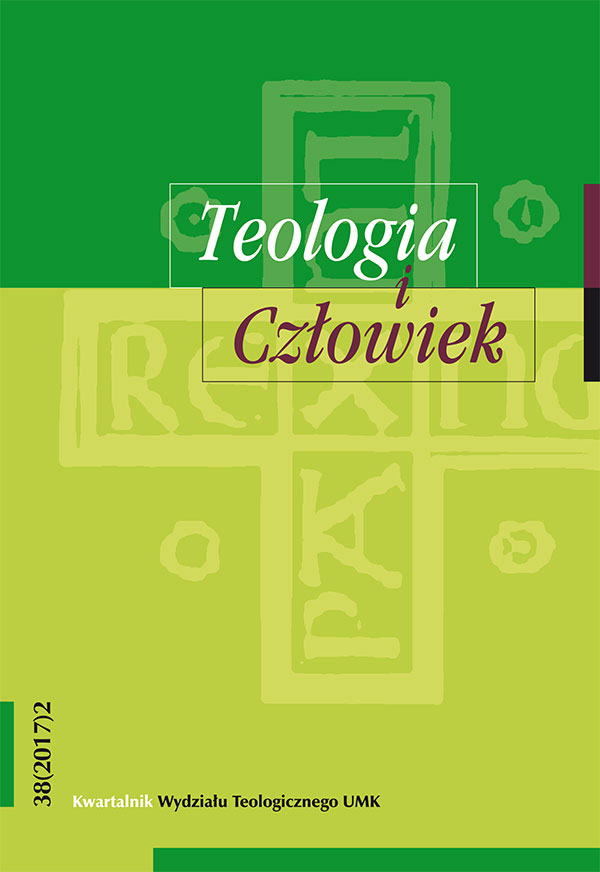Bierzmowanie w modelowaniu duszpasterskim. Artykuł dyskusyjny
DOI:
https://doi.org/10.12775/TiCz.2017.019Słowa kluczowe
bierzmowanie, katechumenat, duszpasterstwo młodzieży, inicjacjaAbstrakt
W dyskursie publicystycznym coraz częściej sakrament bierzmowania nazywany jest „sakramentem pożegnania z Kościołem”, a także „ostatnim namaszczeniem”. Oba te określenia odnoszą się do faktu, że bardzo wielu młodych ludzi po przyjęciu tego sakramentu zrywa więź z Kościołem. Okazuje się więc, że przygotowanie do przyjęcia tego sakramentu nie stwarza trwałej więzi ze wspólnotą Kościoła, z czego można też wnioskować, że motywy przyjęcia go okazują się niedojrzałe. Wielu przyjmuje ten sakrament jedynie, aby nie mieć później problemów z Kościołem: aby móc zostać rodzicem chrzestnym oraz żeby móc zawrzeć sakramentalny związek małżeński. W tej sytuacji rodzi się pytanie o program przygotowania do tego sakramentu. Liturgiści i dogmatycy sygnalizują potrzebę powrotu do dawnej praktyki Kościoła, gdy sakrament bierzmowania poprzedzał przyjęcie I Komunii Świętej. Duszpasterze opowiadają się za utrzymaniem dotychczasowej praktyki Kościoła, gdyż jest to faktycznie jedyny pomysł na organiczne duszpasterstwo młodzieży. W sytuacji zaniku katechumenatu społecznego i rodzinnego, obowiązek wprowadzenia w wiarę spoczywa na wspólnocie parafialnej. Istotnym pozostaje pytanie, czy należy wiązać katechezę inicjacyjną skierowaną do młodzieży z przygotowaniem do bierzmowania, czy też może oddzielić oba procesy katechetyczne.
Bibliografia
Bagrowicz J., Społeczny wymiar odpowiedzialności Kościoła za dzieło edukacji religijnej, „Studia Włocławskie” 11 (2009), s. 118–131.
Benedykt XVI, Posynodalna adhortacja apostolska Sacramentum caritatis.
Blachnicki F., Sympatycy czy chrześcijanie? Katechumenat na dzisiejszą godzinę, Krościenko 2000.
Czupryński W., Katecheza rodzinna według ks. Franciszka Blachnickiego i jej realizacja w Kościele Domowym, „Studia Warmińskie” 49 (2012), s. 165–180.
Delumeau, Wyznanie i przebaczenie. Historia spowiedzi, Gdańsk 1997.
Draguła A., Ocalić Boga. Szkice z teologii sekularyzacji, Warszawa 2010, s. 61–86.
Franciszek, Posynodalna adhortacja apostolska Amoris laetitia.
Główny Urząd Statystyczny, Raport „Życie religijne w Polsce”. Badanie spójności społecznej w roku 2015.
Instytut Statystyki Kościoła Katolickiego SAC, Annuarium Statisticum Ecclesiae in Polonia AD 2016, Warszawa 2016.
Instytut Statystyki Kościoła Katolickiego SAC, Annuarium Statisticum Ecclesiae in Polonia AD 2017, Warszawa 2017.
Jakimowicz M., Ostatnie namaszczenie, „Gość Niedzielny” 2011, nr 20.
Normy porządkujące zasady przygotowania i przeżywania Pierwszej Spowiedzi Świętej i Pierwszej Komunii Świętej w parafiach Archidiecezji Szczecińsko-Kamieńskiej, Szczecin, 02.10.2013 r.
Piwowarski W., Od „Kościoła ludu” do „Kościoła wyboru”, w: Od Kościoła ludu do Kościoła wyboru. Religia a przemiany społeczne w Polsce, red. I. Borowik, W. Zdaniewicz, Kraków 1996, s. 9–16;
Potocki A., Problem polskiej wiary. Uwagi socjologa, „Colloquia Theologica Ottoniana” 1 (2014), s. 35–57.
Program do bierzmowania „Życie Boże”. https://wnk.diecezjazg.pl/katecheza-do-inicjacji-chrzescijanskiej/#1460225304495-1f2d0727-feb8 [dostęp: 25.01.2017].
Sobór Trydencki, Sesja V, Dekret o nauczaniu i głoszeniu.
http://adonai.pl/sakramenty/bierzmowanie/?id=1 [dostęp: 25.01.2017].
http://dibelius.blogspot.com/2012/11/sakrament-pozegnania-z-koscioem.html [dostęp: 25.01.2017].
http://kosciol.wiara.pl/doc/491402.sakrament-bierzmowania-dojrzalosc-czy-pozegnanie [dostęp: 25.01.2017].
http://old.episkopat.pl/radio_watykanskie/55865.1,Biskupi_Irlandii_Referendum_o_malzenstwach_homoseksualnych.html [dostęp: 25.01.2017].
http://wiadomosci.onet.pl/szczecin/zachodniopomorskie-pierwsza-komunia-swieta-wedlug-nowych-zasad/qp3v4 [dostęp: 25.01.2017].
http://www.faustynahelenow.pl/kancelaria-parafialna/bierzmowanie.html [dostęp: 25.01.2017].
Pobrania
Opublikowane
Jak cytować
Numer
Dział
Licencja
CC BY ND 4.0. Posiadaczem prawa autorskiego (Licencjodawcą) jest Autor, który na mocy umowy licencyjnej udziela nieodpłatnie prawa do eksploatacji dzieła na polach wskazanych w umowie.
- Licencjodawca udziela Licencjobiorcy licencji niewyłącznej na korzystanie z Utworu/przedmiotu prawa pokrewnego w następujących polach eksploatacji: a) utrwalanie Utworu/przedmiotu prawa pokrewnego; b) reprodukowanie (zwielokrotnienie) Utworu/przedmiotu prawa pokrewnego drukiem i techniką cyfrową (e-book, audiobook); c) wprowadzania do obrotu egzemplarzy zwielokrotnionego Utworu/przedmiotu prawa pokrewnego; d) wprowadzenie Utworu/przedmiotu prawa pokrewnego do pamięci komputera; e) rozpowszechnianie utworu w wersji elektronicznej w formule open access na licencji Creative Commons (CC BY-ND 3.0) poprzez platformę cyfrową Wydawnictwa Naukowego UMK oraz repozytorium UMK.
- Korzystanie przez Licencjobiorcę z utrwalonego Utworu ww. polach nie jest ograniczone czasowo ilościowo i terytorialnie.
- Licencjodawca udziela Licencjobiorcy licencji do Utworu/przedmiotu prawa pokrewnego nieodpłatnie na czas nieokreślony
PEŁEN TEKST UMOWY LICENCYJNEJ >>
Statystyki
Liczba wyświetleń i pobrań: 654
Liczba cytowań: 0



